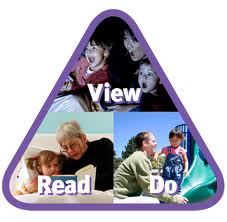Guidelines to select and use educationally appropriate DVDs & TV programming
for your kids:
Use Your Own Judgment
Trust to yourself when judging what is "Good TV" and what is "Bad TV". If you are not sure what your child is learning from a program the answer is probably nothing! There isn't any independent agency for "educational" content. Producers can label almost any DVD as educational - regardless of real educational value.
Use Age-Appropriate Programs
Then consider the age of your child. What is educational for the infant, may well be mind-numbing for your 4 or 5-year-old - and vice versa! The educational content of a DVD should be achievable - yet challenging.
Spend Time Watching TV With Your Child
Try not to use TV as a babysitter. Get involved in watching to help reinforce learning. See how your child has progressed with the material contained in the DVD or TV program.
Let Your Child "Graduate" From a DVD
Once the educational content of a DVD has been learned, that DVD is no longer educational. Many children become addicted to a book, a puzzle or a DVD. Once a child has mastered the material in a book, puzzle, or DVD introduce more challenging material. They will come to love the new just as much as the old.
Look for DVD That Teaches Specific Skills
Material that is labeled "stimulating" may have little to offer your child. Stimulation is found primarily through active exploration of the world around us. Be selective and choose videos that have a specific learning focus.
Avoid Introducing "Entertainment Only" DVD Too Early
Introducing your child to DVDs that provide little educational content can make it very hard to get your child interested in educational TV fare. Just as you would not feed your child cookies before a meal - don't introduce "fluff" TV before introducing solid educational programming. Just like a cookie, this can spoil an appetite for better stuff!
DVD or TV should be used only as a supplement to regular stimulation, love & fun.
Parents need to be very careful and selective about what they allow young children to watch or about limiting the total quantity of TV viewed. The best way to assure that your child's viewing time is used well is to spend time with your child while watching TV. Be sensitive to your child's skill level and choose the material that is appropriate to his/her developmental stage. TV can be a great teaching tool - or it can be a big problem. How TV is used is up to you, the parent.


No comments:
Post a Comment